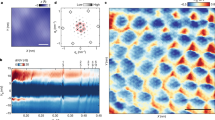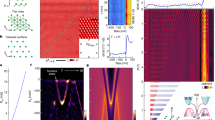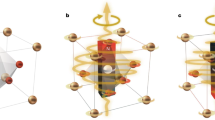Abstract
IT was discovered by Landau1 that an electron gas should have, besides its spin paramagnetism, an appreciable diamagnetism due to the quantized orbital motions of the electrons in the magnetic field.
This is a preview of subscription content, access via your institution
Access options
Subscribe to this journal
Receive 51 print issues and online access
$199.00 per year
only $3.90 per issue
Buy this article
- Purchase on Springer Link
- Instant access to full article PDF
Prices may be subject to local taxes which are calculated during checkout
Similar content being viewed by others
References
Z. Phys., 64, 629 (1930).
The theoretical curve was plotted with the help of the tables for the Fermi-Dirac integrals given by Stoner, Proc. Leeds Phil. Soc., 3, 403 (1938). The experimental values are from the measurements by Krishnan and Ganguli, Z. Krist., A, 100, 530 (1939), and some unpublished measurements by Ganguli.
Author information
Authors and Affiliations
Rights and permissions
About this article
Cite this article
KRISHNAN, K. Landau Diamagnetism and the Fermi-Dirac Energy Distribution of the Metallic Electrons in Graphite. Nature 145, 31–32 (1940). https://doi.org/10.1038/145031a0
Issue Date:
DOI: https://doi.org/10.1038/145031a0
Comments
By submitting a comment you agree to abide by our Terms and Community Guidelines. If you find something abusive or that does not comply with our terms or guidelines please flag it as inappropriate.



